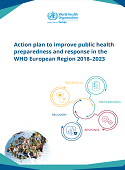Action plan to improve public health preparedness and response in the WHO European Region 2018–2023

Download
2019, iv + 24 pages
ISBN 978 92 890 5391 4
This publication is only available online.
The action plan to improve public health preparedness and response in the WHO European Region, 2018–2023, aims to strengthen national and regional capacities to effectively prevent, prepare for, detect and respond to public health threats and emergencies and to provide support to affected countries, when necessary. It takes into account actions taken and lessons learned in the Region since the International Health Regulations (IHR) (2005) entered into force in 2007, and as presented in the guiding document EUR/RC67/13, on accelerating implementation of the IHR (2005) and strengthening laboratory capacities for better health in the Region, at the 67th session of the Regional Committee for Europe (RC67) in September 2017. It builds on the five-year global strategic plan to improve public health preparedness and response, 2018–2023, and is tailored to the needs of the Region.
This publication outlines the action plan to be implemented by States Parties and the WHO Regional Office for Europe in collaboration with key partners and in line with the requirements of the IHR (2005). It is structured around the three strategic pillars described in the global strategic plan: (1) building and maintaining States Parties’ core capacities required by the IHR (2005); (2) strengthening event management and compliance with the requirements under the IHR (2005); and (3) measuring progress and promoting accountability. The action plan will be accompanied by a monitoring framework with indicators for each technical area of the strategic pillars.
The action plan incorporates feedback received from the Member States during the Standing Committee of the Regional Committee (May 2018) and through web-based and face-to-face consultations on the global strategic plan. The revised action plan, incorporating the feedback received, was submitted to the 68th session of the Regional Committee for Europe, and was welcomed with appreciation through the adoption of resolution EUR/RC68/R7.



